That's a wrap for Everything Open 2025 - thank you for joining us!
That’s a wrap for Everything Open 2025!
We’re delighted that you were all able to join us in Tarndanya / Adelaide for #EO2025.
In this post, we’re looking back on the conference highlights, covering the findings from our post-conference survey and looking forward to what’s next.
Conference highlights
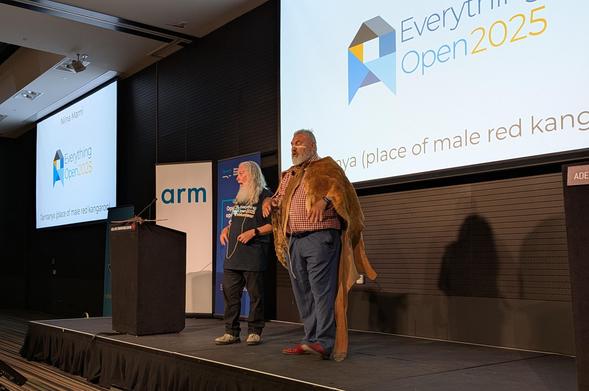
We started proceedings with a Welcome to Country ceremony, where Michael O’Brien, a senior member of the Kaurna people, taught us that listening to one another is crucial for sharing knowledge - very apt for Everything Open.
Principal Consultant at Pivot Nine, Justin Warren, set the bar for the conference with his keynote on sustaining open source systems. Referencing Stafford Beer, he implored us to recognise that the purpose of a system is what it does (POSIWID) - recasting open source software from an artefact to an ecosystem - and demonstrating that the ecosystem was in decline with some actors reaping its benefits at the cost of others (e.g. maintainers). This outstanding talk will resonate for many years.
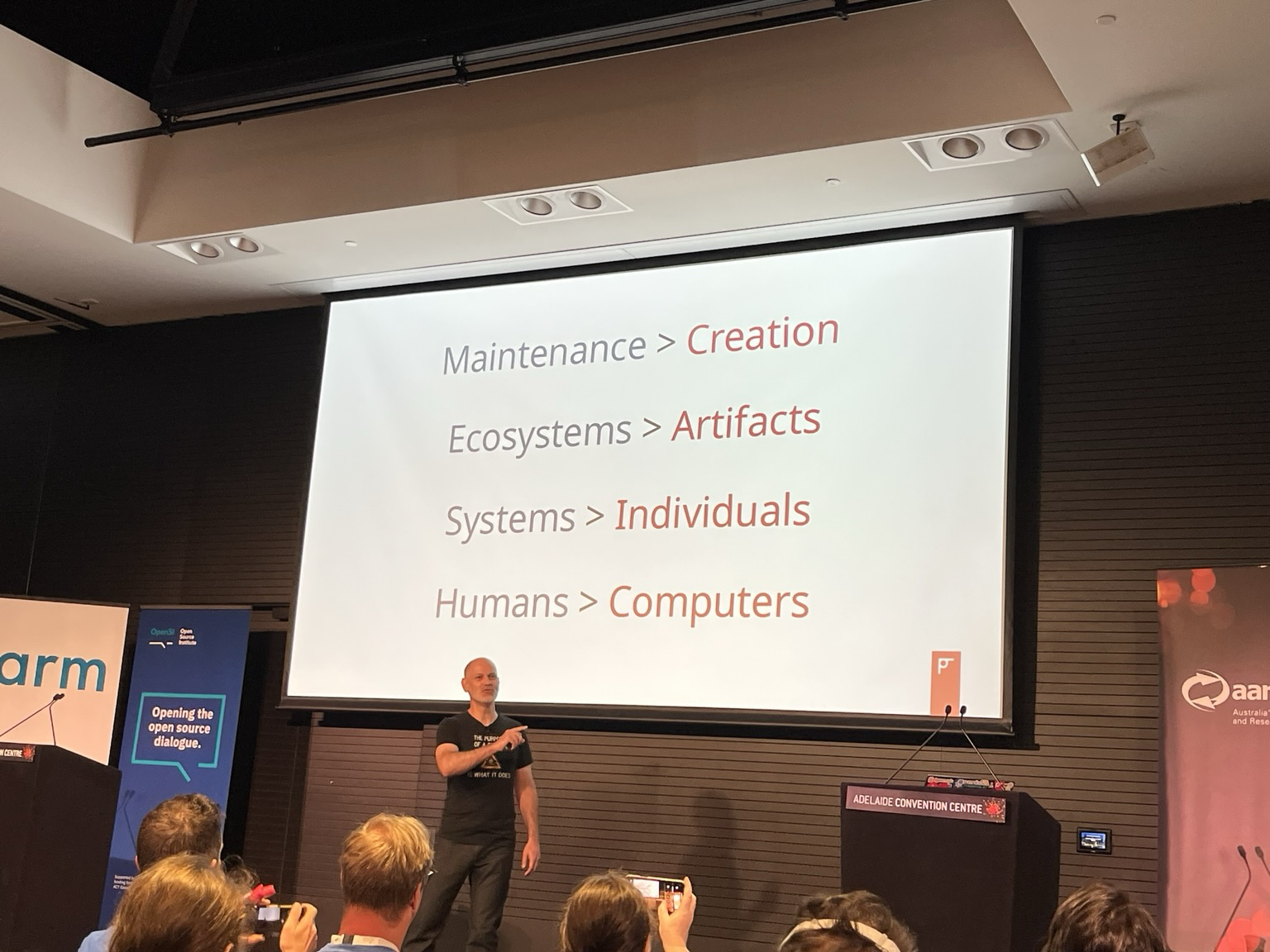
Following Justin’s keynote, talks held on Monday included micrometre scale 3D printing with Vik Olliver, Openness in academic institutions with Sarah Brundrett, how Everthing Open represents part of the larger #hopepunk movement by Nicola Nye, a round up of open source voice interfaces in 2025 by Kit Biggs, open justice frameworks by Emma Davidson, and how the digital divide is affecting older Australians, particularly those in regional rural areas, based on lived experience from Sae Ra Germaine.
On Tuesday, we welcomed MakerQueen and author Steph Piper, who took us on the development journey of Skill Trees, codified in her Skill Seeker: Maker Edition book. At its heart, Skill Trees encourage people to take a journey of exploration with makerspaces, reinforcing that failure is a step on the way to success and visualising progress to provide motivation.
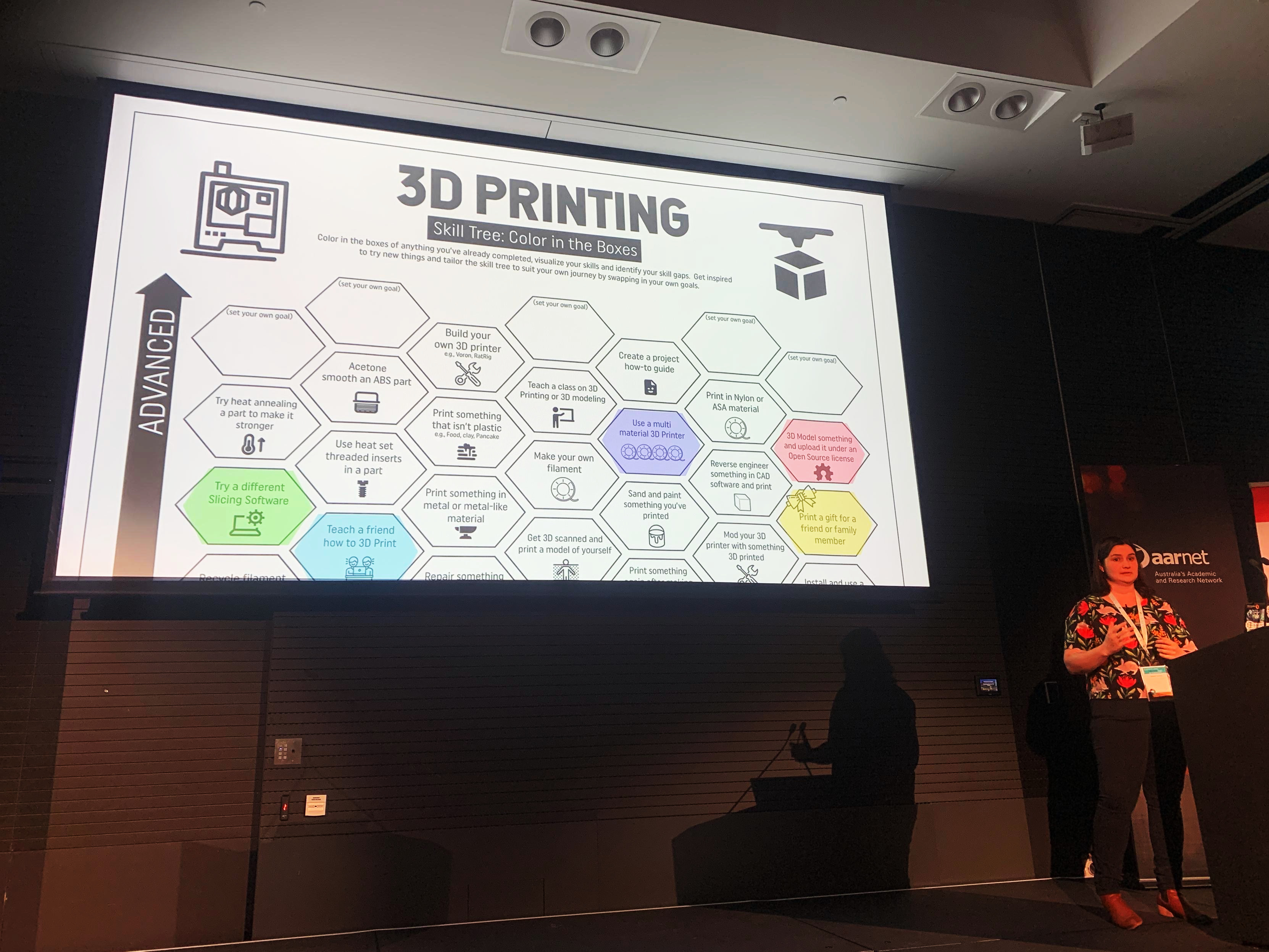
Other notable talks on Tuesday included detecting cosmic ray muons - reminding us of the complexity, age and scale of the university by Robert Hart, how the current thirst for data to feed into LLMs has led to the “Token Wars” and its unanticipated consequences by Kathy Reid, itgrrl’s talk on Everything Open All At Once, which questioned whether openness is desirable in a world of persistent security threats, overburdened maintainers and other consequences of the open movement, a demonstration of the Kanidm authentication project by William Brown, an overview of the open source library management suite, Koha, by Aleisha Amohia and a tutorial by astrophotographer Peter Lieverdink on using siril software for processing high resolution image data
Tuesday evening saw many delegates head to Adelaide Zoo for the Penguin Dinner, where we were treated to canapés and pre-dinner drinks then seated for a scrumptious two-course meal - providing bustling ambience to catch up with collegues new and old.
Trish Hepworth - Deputy CEO of the Australian Library and Information Association delivered Wednesday’s keynote address. Here, she took us on a journey of the Western conceptualisation of what it means to be a library and libraries’ evolving relationship with openness. She left us with challenging provocations for what it means to work with knowledge you hope to hold and share, underscoring the FAIR and CARE principles for open data and working with Indigenous data.
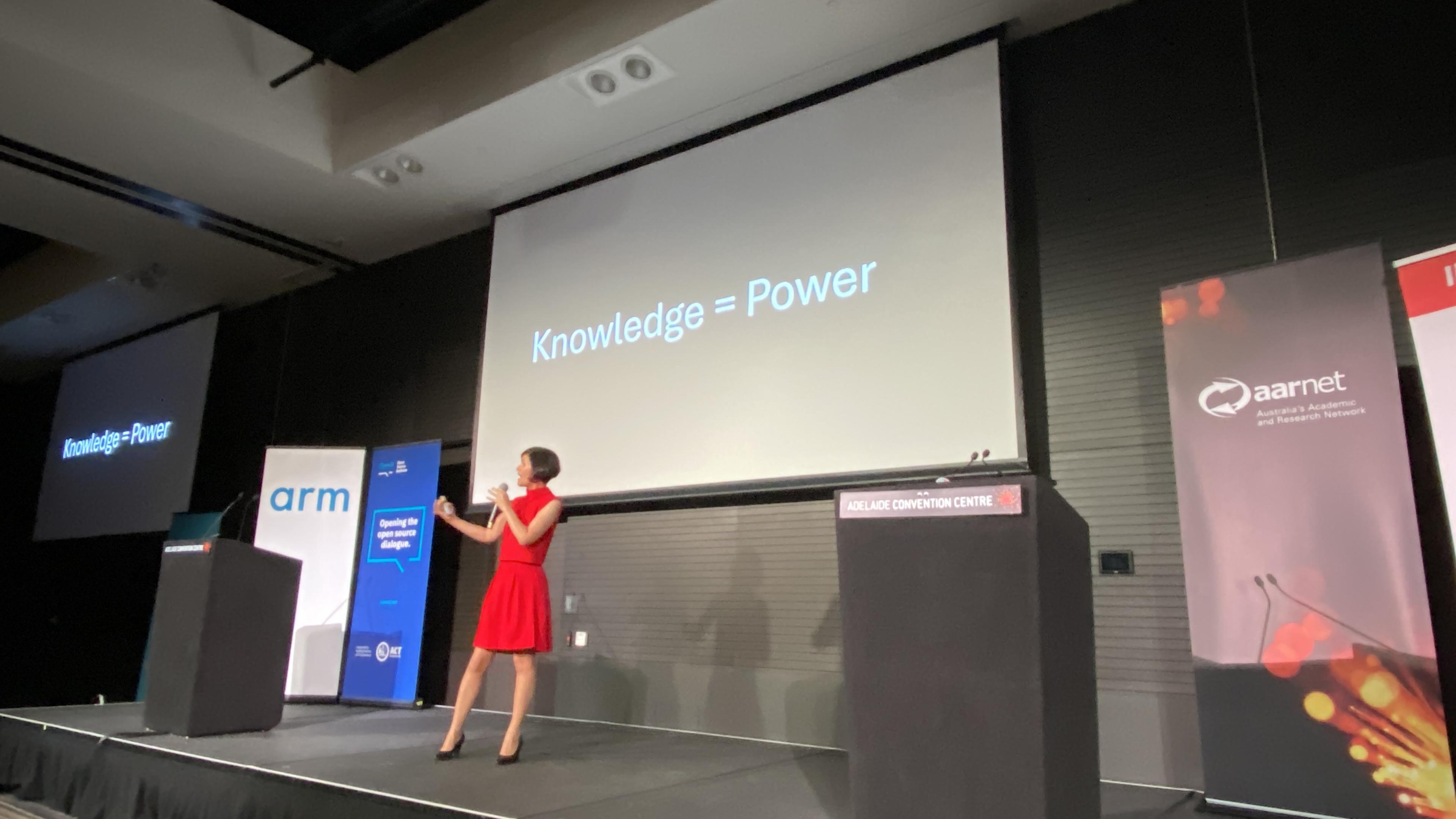
Wednesday talks included an overview of Skupper, a service for distributing kubernetes clusters over multiple sites by Apollo Bradshaw, an introduction to Aiko services for machine learning with Andy Gelme and tips to build and repair empathy with Cait McLeod.
At our conference close, we gave thanks to our incredible Organisers and Volunteers - without which Everything Open would not run.
Please note that we will publish conference videos, where we have permission from Speakers to do so, when we have volunteer capacity to do so. Thank you for your patience.
Post-conference survey findings
In the interests of continual improvement, we asked all Delegates, Volunteers and Organisers to fill out a short post-conference survey. This survey was similar to the one administered in 2024 and helps to provide longer-term trends to inform the continual improvement of Everything Open.
Number of Delegates and breakdown of Ticket Types
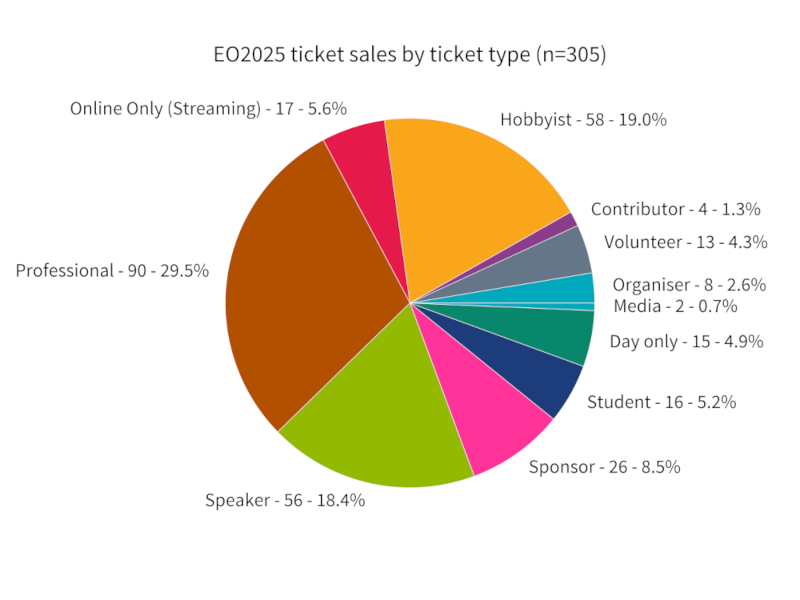
Everything Open 2025 attracted around 300 Delegates, more than doubling attendance from Everything Open 2024 in Gladstone. This is expected given Adelaide’s positioning as a capital city and reinforces Linux Australia’s desire to intersperse capital city and regional locations while ensuring Everything Open gets to as many parts of Oceania as possible. It is too early to tell whether we are observing an uptick in conference attendance due to external economic factors and our planning assumption is that the economy is still very tight.
The capital city location is likely why we observed a drop in people joining Everything Open via online streaming (17 or 16% vs 39 or 22% in 2024). Online streaming places additional audio visual demands on the volunteer organising team, and streaming will remain best effort going forward. Professional audio visual services are a significant cost, and engaging them in the future for streaming will remain dependent on attendance and sponsorship.
Comparing sales by ticket type in 2025 compared to 2024, we note an increase in the percentage of Delegates attending on a Hobbyist ticket in 2025 (58 or 19%) compared to 2024 (16 or 9%). This is likely due to the cost of travel to Gladstone and the ability to “draw” more Hobbyist Delegates from the Adelaide region. We note a very small increase in the percentage of Delegates attending on a Professional ticket in 2025 (90 or 30%) compared to 2024 (47 or 26%) in 2024. We do not see this increase as a signal of an improving external economy: our planning assumption is that sponsorship and Professional attendance will continue to be constrained in the short-term and may significantly worsen given the political changes occurring in the United States.
Survey response rate
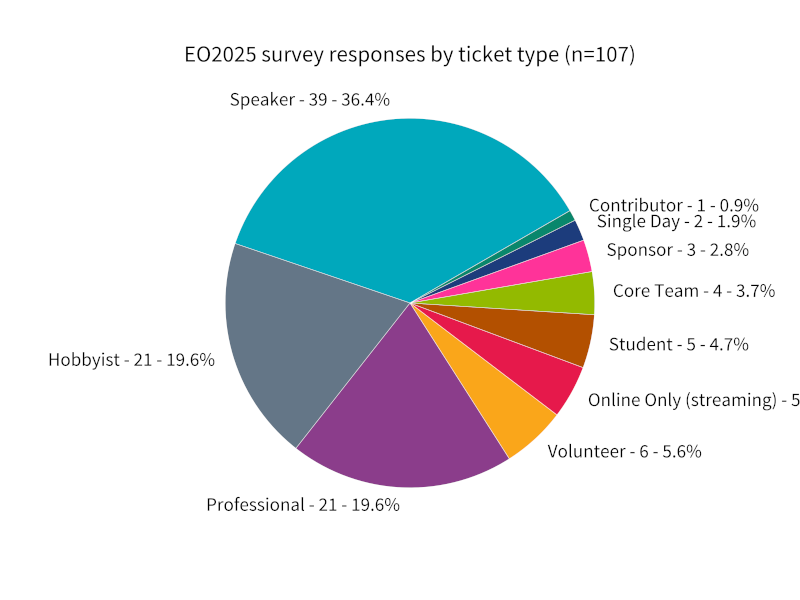
Overall, as shown in Figure 2, we had a response rate of around 33%, which we’re very grateful for. We have responses from all Delegate types except Organisers. We believe the survey sample is therefore representative of the broader Delegate cohort.
How did people find out about Everything Open?

Turning to how people found out about Everything Open 2025 in Figure 3 - which is important information for directing promotional efforts and spend - the dependency on mailing lists for brand awareness is still very marked, but appears to be declining (48.4% lca list, 19.4% eo-announce list, total 67.8% in 2024, compared with 33% lca list, 24.5% eo-announce list, total 57.5% in 2025). In its place, we observed an increasing dependence on social media for awareness (6.5% in 2024, 15% in 2025). Based on the text entry data from this question (which is not shown here), Mastodon was the primary social media channel where Delegates found out about the conference, followed by LinkedIn. This underscores the need for a dedicated Media and Comms role on the conference Organising Team. It also provides a signal that Everything Open should shutter our Twitter account, following precedence by several other Linux Australia auspiced events.
Quality of the conference program

To gauge the quality of the conference offering, we asked people to state their agreement with aspects of the conference, shown in Figure 4. The Keynotes were very highly rated, as was the desire for the community to come together (this rating has no box because the answers were so tightly grouped, it’s not an anomaly). The overall quality the Speakers was quite high. We did observe a higher variance in the responses around the relevance of the program to Delegates. Triangulating this question with the open-ended feedback, we discovered a tension between satisfaction with the breadth of topics covered at Everything Open and the technical depths of talks, with comments advocating for both:
“The program was a good mix of all the elements which go into making EO a solid conference, catering to people from all parts of the FOSS community. The talks themselves were topical and (with a small number of expections) delivered extremely well. All up, it was a very solid program: perhaps one of the best we’ve had for a number of years.”
“Very little deep technical content. Not enough of people talking about cool things they’d done, and too much commentary from pundits or would-be pundits on soft topics — consultant type talks, not developer/user talks.”
“Overall the range of talks were pretty good but I think there could have been more directly technical talks and less of the fluffy talks often from people with little knowledge of the subject.”
“There seems to be a significant decrease in interesting technical topics, is that because it’s harder to attract speakers?”
Note: these are direct quotes for transparency. Where identifiable information about a particular Speaker or Organiser or Volunteer has been given, it has been redacted for privacy.
It is the view of the Session Selection Committee that a balanced Everything Open program will contain a mix of both technical and adjacent topics. We point to sessions such as Nicola Nye on #HopePunk, Cait McLeod on empathy, Donna Benjamin on facilitation and Sae Ra Germaine on the digital divide as topics which might be considered “fluffy”, however are incredibly relevant for all technologists - and increasingly so given current geopolitical tensions.
We note there is also a link here with the Call for Sessions process: the Session Selection Committee can only add a Session to the Schedule if they receive a proposal for it - and we call on the community to encourage Speakers they would like to see to submit to the Session Selection process. This year, we received 115 proposals for 51 available talk slots - an acceptance rate of under 50%. The downside to having more Session submissions is a lower acceptance rate - which can inhibit Speakers from applying - another trade-off.
The Session Selection Committee will continue to navigate these multiple tensions.
It was very clear that the community coming together is very important for Delegates and this was corroborated in the open-ended feedback, particularly around how the venue facilitated this
Plenty of lunch break time to talk to folk.
Plenty of comfy chairs for hallway track.
Chairs!!! There were lots of places for sitting around the venue when not in a talk.
Hallway track! Encouragement to welcome folks in your chatting. The vibe.
The community vibe makes this conference.
Desire to have Miniconfs back again
Several Delegates wanted to see Miniconfs added to the conference Schedule.
Miniconfs would have been awesome
Would’ve liked to have done a hardware miniconf slot if they ever make a comeback.
I miss the miniconfs which gave a solid day of content to point people to.
Bring back the Mini-confs! I would like to have a Open Hardware Mini-conf again
Miniconfs were a part of linux.conf.au but are not currently part of the Everything Open structure. Adding them in requires an additional 1-2 days venue hire. This adds 30-60% additional venue costs and doesn’t necessarily attract 30-60% more attendees. Currently we do not see a five day format as a viable option, based on conversations with delegates and employers. As such, we are not looking to increase the length of Everything Open for the next conference.
We have sought to include the topics and content from past Miniconfs into the schedule by inviting several past Miniconf organisers to be members of the Session Selection Committee. We have also provided the option for both long and short talk durations, however only a handful of submissions opted for the shorter format. The organising team for Everything Open 2026 are looking at ways to tweak the conference schedule to incorporate some more aspects of Miniconfs into the main schedule, so watch out for more details.
Quality of the conference experience

Catering of lunch and Penguin Dinner
Next, as shown in Figure 5, we asked people to indicate whether some aspects of the conference met their needs, so we can adjust in the future. Based on feedback from 2024, we increased the amount of catering available, however our budget did not extend to providing lunch, which was a frequent future request in the open-ended feedback:
“Lunch with the conference would be nice. Maybe the dollars are prohibitive.”
“I understand not catering lunch would help keep ticket prices down, but I am also sensitive that that can add a non-trivial amount to the overall cost of attendance for people such as students, currently unemployed, part-time employed, freelancers, etc. In terms of presentations, it being 3 days is great value for the ticket price but also means needing to budget potentially ~$100 for lunches or avoiding eating out which can lead folks to miss out on networking opportunities.”
The trade-off here is between budget and Delegate experience: catering lunch would have been an additional $30,000 cost and in the absence of more sponsorship, this would equate to a ticket price increase of around $AUD 100 per ticket, jeopardising the event’s affordability.
Again, based on feedback from 2024, we took the decision to subsidise the Penguin Dinner’s per-head cost over and above the ticketed cost. The ticketed cost was $120, however the actual cost of the Penguin Dinner was around $140 per head. This meant that other conference elements - such as professional audio visual services and the travel budget for Speakers - were constrained. Different Organising Teams may make different trade-off decisions in the future.
Tutorials
Based on 2024 feedback, the Session Selection Committee created more space in the Schedule for Tutorials. It appears the right balance has been struck here, although it was observed that some tutorials were poorly attended, likely because the Tutorials run in parallel with other Sessions. This format has been used for many years at linux.conf.au and Everything Open, and we have always seen fluctuations in attendee numbers. At this stage we are not looking to split tutorials out to a separate day, however we will consider this when designing the structure for future conferences.
“I find it disruptive having tutorials run in parallel with the main program. I don’t think it works. I’d prefer to have them run pre or post main conf, that would probably also boost their attendance. That has been done successfully. When there are only about 4 people in the room for a tutorial, while there are 275 people at the conf, I figure there’s some issue.”
“I found the tutorials poorly attended this year. I was the only person in the [specific] tutorial. I’m not sure why this was.
Social events and the need for a Wiki and Matrix for self-organising
One clear trend identified here is a desire for more social events as part of the conference. As a three-day conference, Everything Open hosts one official conference social event - the Penguin Dinner. Unfortunately, the conference budget does not allow for additional formal social events and we rely on the community to self-organise these. We note here challenges with communication channels (such as Matrix) and the absence of a Conference Wiki:
“Possibly seed wiki with information about some things. Pdns, updns, socials, local area, announcements requested by attendees, sharing transport to get to and from venue, suggested accommodation, …? Provide a venue map and map exposing how to reach venue. If it’s not always open, say which in the day it is. Perhaps GPS coords for pre chosen social venues?”
“The Wiki and Matrix rooms were hard to find - I don’t think they existed until after the start.”
“Something like a wiki that people can get on to easily, and participate. As things, sign up for activities, etc. Many didn’t know about things. Make the main communication medium clearer, quite a few attendees didn’t know about or didn’t bother installing a matrix client”
“No consistent communication channels. Some information was hard to find. (eg wiki). Disconnected digital community - where do we all hang out these days in a post IRC/Mailinglist world?”
“It would be good if info about the conference was all located in or referenced from a central cohesive place, it seemed to be smeared across Gitlab wiki, EverythingOpen website, matrix, signs around the venue and who knows where else(?) I got confused trying to find info.”
“The Matrix app was difficult and didn’t appear to always work smoothly. I’d prefer to use Discord which I think is more familiar to most – particularly if you’re keen to draw in participants who aren’t purely tech people”
This year the wiki was setup by Delegates, not by the Organising Team, which meant it was not referenced from official materials and was more complicated to use than in past years. There were two reasons for not setting up an official wiki this year - first, there are some challenges with how MediaWiki works with our current setup, and second, the demand for a wiki over the past few years has been very low. We recognise from the feedback that this is something Delegates would like to see return, so we will ensure a wiki is available for the next conference.
As for chat, we are committed to using open source systems as much as possible. While we understand that some people find Matrix confusing, it is still the best open source option available to us at the moment, with minimal effort required from us to use it. We are aware that many other communities use Discord, however we have decided to not use it due to being closed source. We will ensure the Matrix channels are published on the website for the next conference so people know where to go in advance of the event.
Conference Schwag
Next, we asked for written feedback about the conference Schwag available on RedBubble. In general, most Delegates were not aware of the RedBubble shop, which points to additional communication to Delegates being needed in the lead up to the conference.
“I didn’t realise I could order swag through the Red Bubble shop.”
“I did not know about the Redbubble shop. I can’t find any Emails mentioning it?”
This year the team did not focus on schwag, and it was a last minute decision to setup a shop for it. This will be considered earlier in the process for the next conference, and plans will be communicated earlier to delegates so they know what is happening.
Attending or recommending a future Everything Open event

Turning to whether people would attend an Everything Open conference or recommend one to a colleague in the future (see Figure 6), we found a very high likelihood of both - which bodes well for the future!
Other themes in the open-ended feedback
Several other themes that were not covered directly in the above questions were expressed in the open-ended feedback:
Conference videos
In previous iterations of the conference, we had employed a professional audio-visual service provider. However, with constrained budgets we have had to rely on a volunteer-based process for video production. This was highlighted as a pain point for Delegates:
“The lag between the talk and the videos going online seems to have increased tremendously.”
“I’ve been a little disappointed that talk videos take weeks or months to make it online. Timely video uploads help make a conference “of its moment” in the wider community and discussion online, and I think they also help build buzz that encourages some people to attend the next conference in person. I know for some speakers having the talk published is a major part of the benefit that comes from the work they put into preparation (after all, maybe only dozens or low hundreds will be able to attend but thousands can watch online). Acknowledge that the video prep is a volunteer process, and I have no doubt the people currently working on this are going as fast as they can, but I wonder whether there’s a way more volunteers can bolster their numbers or assist in another way?”
The videos for Everything Open 2024 definitely took too long to process, and this is not something we want to repeat. We are working on the video pipeline to make it viable to get the videos processed quickly once again. Without a pipeline we cannot get more people involved easily, so we need to get this setup and then we can invite others to assist with the process. One thing we do want to make clear is that we are not looking to necessarily deliver all videos during the conference - while we had this in the past, we have made a conscious decision to delay the video release slightly (read: a few weeks) to give a reason to attend the conference. This is also why we now charge for live streaming instead of making it free, as we need to make it clear that producing the videos and streaming them is not a free exercise.
Bringing back professional video production services would add around $30,000 of cost to the conference. In the absence of sponsorship - which is difficult to obtain in a constrained economic climate - this would add a cost of around $100 to the ticket price, which challenges affordability. For example this would take a Hobbyist ticket from $399 to $499 - which is still incredibly cheap for a 3-day conference, but higher than some in our community would be able to afford. We will therefore continue to focus on improving our video setup so we can process the videos faster while keeping it volunteer run.
One piece of feedback questioned whether it was worth using Linux Australia cash reserves to fund video processing:
“Maybe the cost is prohibitive, but with a million dollars in the bank I think it’s worth something to get the job done.”
We would like to clarify that Linux Australia maintains a large cash reserve - of around $800,000 - instead of taking out event insurance for each event - Everything Open, PyCon AU, Kiwi PyCon, DrupalSouth, WordCamps - so that an event could be cancelled for an unforeseen reason (like a pandemic) and Linux Australia would remain financially viable as an auspice. As the stable of Linux Australia-auspiced events grows, the cash reserve needs to be maintained rather than eroded. Events should be financially neutral at worst. We will also note that Linux Australia’s funds are not just there to spend on Everything Open - LA might act as the steering committee for the conference, but Everything Open is treated like any other event auspiced by LA and it must be independently financially viable.
Diversity, equity, inclusion and public health considerations
Some open-ended comments referenced diversity, equity, inclusion and public health considerations.
“I would have liked to see more masking. Maybe not mandatory, but it could easily have been set as a much stronger norm and masks and sanitizer available outside each room.”
Despite the Health Statement saying “we strongly encourage the wearing of masks while at the conference”, I saw few, if any volunteers or organisers masking, and in my estimation, only 5% of other attendees were doing so. I understand masking isn’t pleasant, and enforcement can be significantly extra effort. We wear masks not because we like masks, but because we like people who need masking policies to safely attend. Even an additional “please wear a mask” mention on the opening slide which said “wash your hands. Don’t come to the conference if you feel unwell”, would’ve been a significant step.”
We note that hand sanitiser and masks were available at Rego Desk for all attendees, in line with our Health Statement and note the desire here to have Organisers normalise masking.
“I would have liked to see non-gendered restrooms. I know it’s the venue, but maybe temporary signs could have covered them.”
We understand the need to be supportive of the experience of all genders at Everything Open. However, the gendered restrooms were unfortunately a limitation of the venue we needed to work within.
“Pronoun stickers, traffic light indicators for interaction, and all gender restrooms.”
“Badge decoration table would be awesome.”
We have noted the feedback about pronoun stickers and traffic light indicators for interaction to include in future conferences.
Praise for Organiser and Volunteer efforts
Delegates were full of praise for the efforts of the Organising Team and Volunteers:
Amazing. Top notch. Phenomenal effort. Now rest. All of you.
Huge thank you for the event. Great boost at the beginning of the year.
Every time I come to an LA event I’m blown away by the quality, the dedication of so many people, and just how fantastic and friendly everyone is. We’re incredibly lucky to have events like EO, given that we’re members of a pretty niche technical community on a sparsely populated island that’s a long way from most tech-centred events. Thanks for all of it!
Thank you for putting on this wonderful conference. It was a lovely vibe and I really appreciated the opportunity to attend and connect with others in Open :)
I’m very appreciative of the amazing work put in by the organizing team, not just for one conference but for several of them, despite some significant challenges (the covid epidemic not the least of these). I hope that you are able to overlook the few noisy whingers and see the joy that you have brought to the many who have been able to attend. It is certainly a highlight of the year for me the times I am able to attend in person.
Fabulous work by all the organisers, volunteers, and speakers. Adelaide was also a great choice of location - a lovely chill city, good weather, easy to get around, and cheaper to travel to than Sydney for example.
I’m forever amazed at the work done by the organizers and volunteers at EverythingOpen, linux.conf.au and other Linux Australia events.\n\nYou are a truly awesome group of folk! Thank you for running the event!
Hello! This is a little note of appreciation. It is an enooooormous amount of effort over a long time to put a conference together. I know everything is a juggle of compromises and opportunities. And in the meanwhile you all have day jobs too. But the community spirit you created space for was genuinely heartening and brought about joy.
Congratulations to everyone involved in any aspect of EO2025. It was in my view an excellent conference and I am very appreciative of the time, effort and energy it took to bring it to fruition. Thank you all.
Thanks to all the organisers, volunteers and LA committee for ensuring the free software / open culture community continues to have a world class conference in AU/NZ!
Praise from a first-time Everything Open attendee
Perhaps the final word from our post-event survey goes to Ash Barber, Senior Co-ordinator, OER Collective at the Council of Australasian University Librarians, who writes:
“I am grateful for being given the opportunity to attend the Everything Open conference this year. Providing scholarship options for attendees who otherwise could not afford to attend shows the conference lives their values of open and accessible. This warm and wonderful conference brings together experts and learners from across all realms of Open, enabling cross-discipline knowledge-sharing and connection. I particularly enjoyed the sessions related to the intentional redesign of Open systems, the library’s role in closing the digital divide, and open data as social justice. My favourite part was the mad dash lightning talks on the final day of the conference. It was fun, energetic, informative, and accessible to speakers of all experience levels. 10/10 would recommend the Everything Open conference for anyone in the Open, GLAMR, or tech space.” - Ash Barber, Senior Coordinator, OER Collective, Council of Australasian University Librarians
Thank yous and next steps
Everything Open would not happen without a huge amount of voluntary effort from many people. Our Organising Team worked diligently 6 months to a year out from the conference, co-ordinating venue, sponsors, speakers, keynotes, ticket sales, communications and media, audio visual and much, much more. During the conference itself, our Volunteers provided Registration Desk, Room Monitoring, Audio Visual and Streaming, ushering and many more tasks too numerous to mention. Thank you.
A huge thank you to our Sponsors - AARNet, ARM, Open Source Institute, Code Construct, GLAM IT, Google, Red Hat, Honeycomb.io, No Starch Press, CAVAL and Foss Force. We could not have delivered this conference without you.
And last, but not least, we’re thankful to you - our Delegates and Speakers. Thank you for submitting talks and the many hours it takes to prepare and practice them. Thank you for convincing your bosses to send you. Thank you for sending yourselves. Thank YOU.
Everything Open 2026
We will be bringing Everything Open back in January 2026, and we will be announcing specific dates and venue details in the coming weeks.
If you’d like to be a part of the organising team, we’re always on the lookout for skilled and dedicated Organisers willing to give around an hour or two a week in the months leading up the conference - just drop us a line at contact@everythingopen.au.
Keep an eye on the Everything Open website for more information.
You can keep up to date with all the Everything Open happenings in the following ways:
Stay in the know
You can keep up to date with all the Everything Open happenings in the following ways: